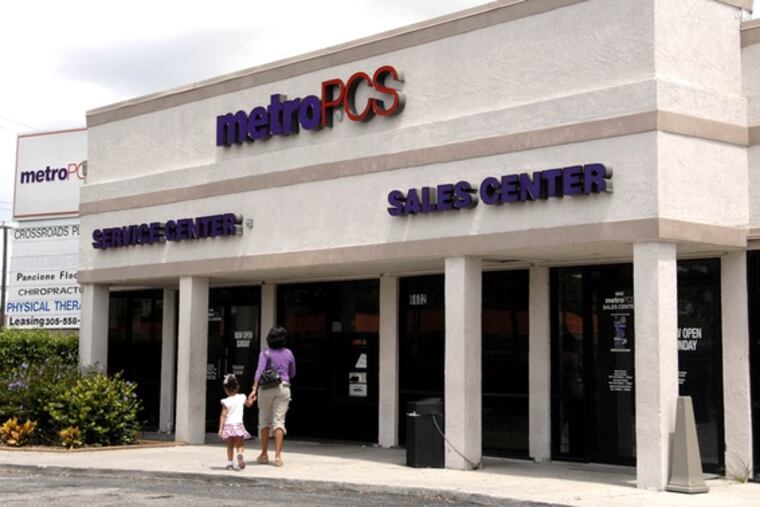PhillyDeals: Cheap-phone firms are hiring in the area
As Chrysler, QVC, and other big employers are cutting jobs in the Philadelphia area, the upstart "no-contract" mobile-phone companies - Cricket Communications Inc. and MetroPCS Communications Inc. - say they're hiring.

As
Chrysler, QVC
, and other big employers are cutting jobs in the Philadelphia area, the upstart "no-contract" mobile-phone companies -
Cricket Communications Inc.
and
MetroPCS Communications Inc.
- say they're hiring.
They're offering cheap phones for hard times.
"These are the 'all-you-can-eat' phone plans. They're looking for value-sensitive consumers . . . people who watch every dollar," says Eric Meltzer, managing director at Curtis Financial, Philadelphia investment bankers.
"Actually, they are pretty well-positioned for the current environment," Meltzer told me. "If you live in Philly and work in Philly, it's a very economic coverage," starting at $30 a month "as long as you don't roam too far."
Cricket, which peddles phones for San Diego-based Leap Wireless International Inc., said in a release yesterday that it "will bring 1,450 jobs to Philly."
In reality, Cricket is hiring 250 people for its new operation. The other 1,200 is just an estimate of what Cricket's "dealer-partners" may add for their stores, said spokeswoman Meredith Joseph. Cricket will hold job fairs for the 250 slots from 9 a.m. to 4 p.m. Dec. 2 at the Hilton Philadelphia Airport, and Dec. 4 at the Philadelphia Marriott Downtown.
This echoes last summer's push by MetroPCS, Cricket's sometime-rival, sometime-merger-talks partner, which said in July that it would be "creating an estimated 800 jobs" around Philadelphia by the end of the year.
So far, MetroPCS has hired around 100 for eight local stores (the ninth opens next week on Aramingo Avenue), plus 100 more at its Fort Washington service center and regional headquarters. That's not counting more at All You Can Talk stores and others contracted to sell MetroPCS phones, said market head John Shelton.
Look up!
The Philadelphia City Planning Commission moved today's 1 p.m. meeting to the Friends Select School auditorium, 17th and the Parkway, so it can accommodate the crowd of Parkway-area residents expected to review proposals by developer Garrett Miller and investor Hill International, of Marlton, for the 1,500-foot American Commerce Center office tower and mixed-use development proposed for 19th and Arch streets.
Gray Smith, a Philadelphia architect retained by the Kennedy House Residents Association, says members believe the complex is way too big for current Parkway zoning, pushes Center City into low- and mid-rise neighborhoods, where it doesn't fit, and would choke traffic and block residents' views.
It's bold to talk about building skyscrapers that have no lead tenants or lenders, amid a credit-market meltdown. At least the city's planning ahead.
The fund wars
As a lobbyist and eventual head of the Investment Company Institute, Matthew P. Fink had a front-row seat on the mutual-fund industry's rapid growth in the 1980s and 1990s.
His new book, The Rise of Mutual Funds (Oxford University Press), traces the industry's origins in the stock-market-crazed 1920s and the battle to regulate investments in the New Deal, when a Philadelphia critic called mutual funds a "snare for men of small means."
Fink sums the steps that led to Vanguard and Fidelity, including the 1936 tax on dividends that made fund ownership more attractive, as well as the funds' Cold War-era role as "insurance against Socialism or Communism."
And he recounts the minutiae of lobbying battles he led: "As I had hoped, industry critics went overboard . . .," he said.
Fink's book peaks with the mutual-fund-trading scandals of the early 2000s, and the resulting fee limits passed in Congress, which Fink predicted "would commoditize, homogenize, and dumb down the fund industry," driving "good portfolio managers" and "wealthy investors" out of mutual funds and into hedge funds.
Mutual funds' bigger problem is that the stock market has been flat over the last 10 years, bond values are down, and some big investors have abandoned public markets. Still, small investors, with few alternatives, have kept faith with Fink's old clients.
Fink will be honored today at a reception at law firm Morgan, Lewis & Bockius L.L.P., in Philadelphia.